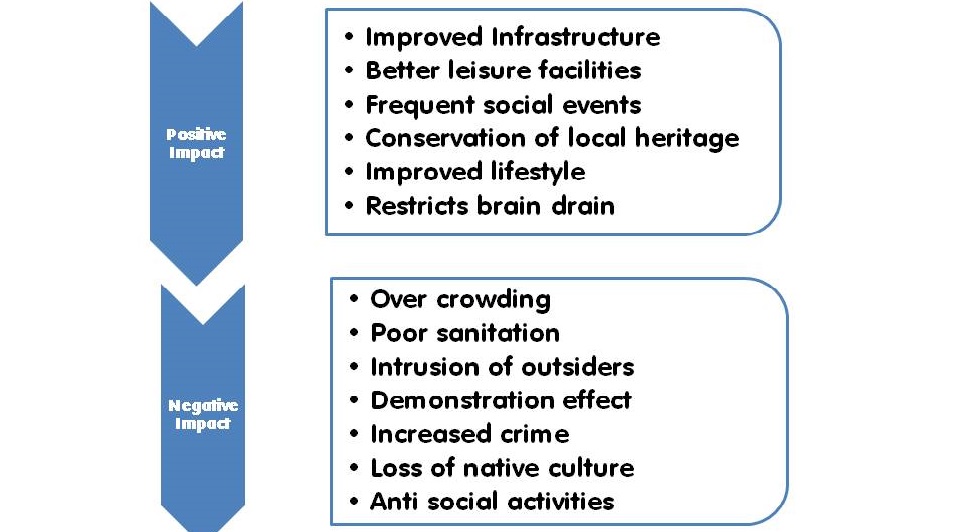
Tourism can have different effects on the social and cultural aspects of life in a particular region depending on the strengths of the region. The effect can be positive or negative. Tours also focus on unique natural or geographical features like coastline, islands, mountains, spas, countryside, etc. In these places, the provision of tourist services and the pressure of tourists are bound to have impacts on the environment, the economy, local social practices and on the populations.
Tours can take place within national borders or anywhere in the world. Such a decision will have an impact on the economy of both the country of origin and the destination site of the tourist.
The social and cultural consequences of tourism originate in the “encounter” or the “contact” with the tourist. To understand this, we need to understand the role of the tourist, the host and the encounter; awareness of the importance of the notion of demonstration effect; an understanding of the consequences of tourism for host societies; and an awareness of the process and outcome of tourism-induced cultural change.
As tourism expands to increasingly remote and exotic destinations, often in less developed countries, the impact of visits on the host community and its culture has become a significant issue. Tourism can sustain the community economically through employment, expenditure and infrastructure development, but it also has less desirable consequences for host communities, causing social and cultural changes within these societies.
Reasons for social and cultural impact
- The contrast between affluent tourists and residents of the world’s poorest countries can be startling in terms of behavior, language and culture – contrasts that can lead to significant and irreversible changes in the host society.
- Tourists bring new cuisines and customs, which are slowly being adopted
- Societies and cultures are constantly changing and often tourism can be a scapegoat for the inevitable change that would have happened without tourism
- Tourists are strangers in the destination, their behavior, language and way of dressing are often very different from the host, which leads to the idea of social or cultural distance. This means that while the tourist can act as a catalyst for change in the host society, tourists themselves are vulnerable to crime and exploitation, simply by their status as outsiders less aware of local behaviors and habits. .
Positive social and cultural impact
To boost tourism, huge sums are invested in preserving local heritage, improving infrastructure, providing better local facilities, which in turn creates better education, better leisure facilities, organizes frequent social events and therefore a better way of life for the local population. They interact with tourists; mingle with people from diverse backgrounds creating a cosmopolitan culture in the region. Due to the demand for better services, therefore, varied employment opportunities are created in the region and people do not feel the need to migrate to other cities to earn a living. Below are some positive impacts of tourism:
- Where tourism is developed, it acts as a magnet for employment, often attracting young people and women from the rural hinterland to work in the seaside resorts.
- Leads to rural depopulation and giving women economic independence
- Awareness and recognition of the destination is enhanced and locals and industry will be exposed to ideas from other countries and international good practice
Negative social and cultural impact
Due to the heavy traffic in the area, the infrastructure may not be able to cope with the increased rush thus resulting in overcrowding, poor sanitation which may further lead to illness among tourists as well as the local population. The intrusion of foreigners into the region can disturb the local culture and create unrest among the population. Local people may copy tourist lifestyles through the demonstration effect and the result could be the loss of native customs and traditions. Some people may engage in criminal activities to fetch easy money from tourists, resulting in increased crime and anti-social activities and loss of moral and religious values. Below are some negative impacts of tourism:
- Has the effect of diverting labor from the land and more traditional craft enterprises, threatening their existence
- Impact on job quality and seasonality
- Local populations may be relocated to make room for tourism development
- The danger of the emergence of economically powerful groups and the balance of power can shift from local decision-makers to national and international actors
- Decisions relating to the development, marketing and promotion of the destination will not be made locally
- Inflated prices in shops and high land or real estate prices
- Tourism has been associated with low moral standards including prostitution, crime and gambling, although tourism is of course an easy target to blame here.
Related links
You May Also Like Hospitality Industry Overview | What is travel and tourism | Components of the tourism industry | Types of tourists | Impact of the tourism industry | Challenges in the tourism industry | Environmental impact of the tourism industry | Economic impact of the tourism industry | Social and cultural impact of tourism

